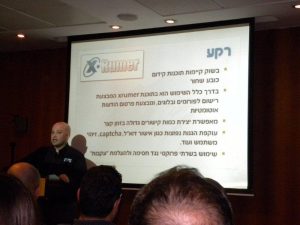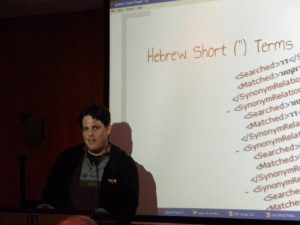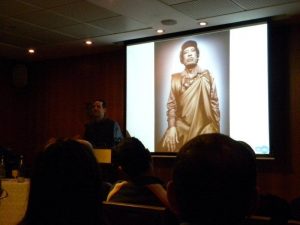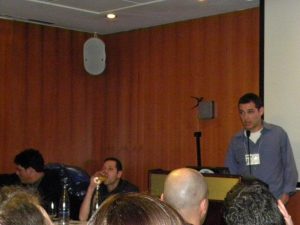Hebrew SEO – SMX Israel 2012
Hebrew SEO was the only panel that did not went in English on SMX Israel 2012. Nekuda’s Gilad Sasson moderated the panel that featured Ori Golan of SEORI, Oren Shatz of SEO Israel and Uri Breitman of TBWA.
Ori Golan talked about Hebrew SEO after Google’s Panda updates.
How do you recognize updates? If the website wasn’t changed and suddenly dropped in the search engine results, it might have been filtered by the search engine’s algorithm new filters, whose job is to filtrate from the search results websites that do not meet the new criteria or crossed any red line.
What is the difference between filtering and banning? A banned site completely disappears from the search results. Filters only screen keywords, and the drop in search engine ranking is seen only on specific search terms.
When algorithm updates take place, the same actions that placed you on the top results might be responsible for kicking you out of the results today.
Ori recommends about a work routine as a way to recognize problems. For example: use the same anchor text, build links only to the homepage and mostly from same sources.
How to return to the search results?
Tip the balance: build links from various domains, especially authority sites from the same or similar niches; link to inner pages and not only to the home page, diversify the anchor text of the incoming links.
Also pay attention to the outgoing links in your website: if your site links to irrelevant sources (that are not related to the page from which they are going, to punished websites or sites that no longer exist, the search engine position may be affected.
Drop in search engine ranking can also be affected by content issues such as duplicated content or keyword stuffing.

Oren Shatz wonders whether Israel SEO specializes in site attacking.
He talks about Xrumer, top black hat SEO software, that generates quantity of immediate links, mostly from Russian forums, without leaving any traces.
These methods were commonly used by very competitive niches. Today, the spam has spread to broader niches, such as SEO for example. That way, sites leap to the top search engine ranking, and disappear as fast as they appeared.
The software is also being used to drop competitors’ websites, also known as “Google Bowling”, i.e. roll the “links ball” to the sites rank higher than your site in order to drop them down.
According to Google’ official statement in this issue, an ingoing link cannot affect a website. But in fact, negative links do harm.
If your site was attacked –
– Balance negative links with positive links. In this situation, prefer quantity over quality, including site-wide links that all come from the same domain.
– If you have no choice – change domain name (obviously, with no 301 redirect), and risk losing all the work and seniority already achieved. Other possibilities are preparing in advance an alternative domain in case of drop in search engine ranking (recommends it to SEO professionals in competitive niches to take this risk in account), or buy an existing account of the same niche and promote it.
Uri Breitman talked about Google search term report and its advantages for SEO comparing to the keyword tool.
He opens his talk with a statistical data. There are about 0.15% Hebrew speakers worldwide, what complicates keyword researching in Hebrew.
Most search engine optimizers use Google’s keyword tool. It is free, but limited, undated, does not suggest perfect long tail terms and hides lots of information.
Google Analytics is limited too, especially when a website is new or low in traffic. In Google Analytics, all you get is what there already is.
Google search term reports arrives from PPC, search engine advertising. It is not a free tool, and to use you must open a campaign, but it shows recent search trends, does not undergo filtering or censorship of the search engine. The report shows which search terms clicked on the ad, and it can provide many ideas for keywords and relevant contents.
He provides an example for search terms that were brought up in a recent mortgage campaign: “can you get a mortgage when your account is overdraft?” “What age limitations there are for a mortgage?” and so on. This can teach your on the types of contents people are actually seeking online. You can create valuable content on every question raised on the search terms report, provide focused tips and information.
This tool drawbacks are its price, and that it provides only clicked terms.

Gilad Sasson talked about some of the difficulties in Hebrew SEO and illustrated them using search engine executable file (Gilad Sasson full presentation on Hebrew SEO).
For example, searching for a number generates the corresponding word, but in Hebrew there is more than one word to each number (masculine and feminine); search of ending letters; “gerashayim”, the Hebrew punctuation mark that denotes acronyms; even the plural/singular forms and prepositions are more complicated in Hebrew. Hebrew search engine marketers are required to optimize every keyword twice.
Additionally, statistics show that in Hebrew click rates on top ranked search results are higher comparing to other languages.


